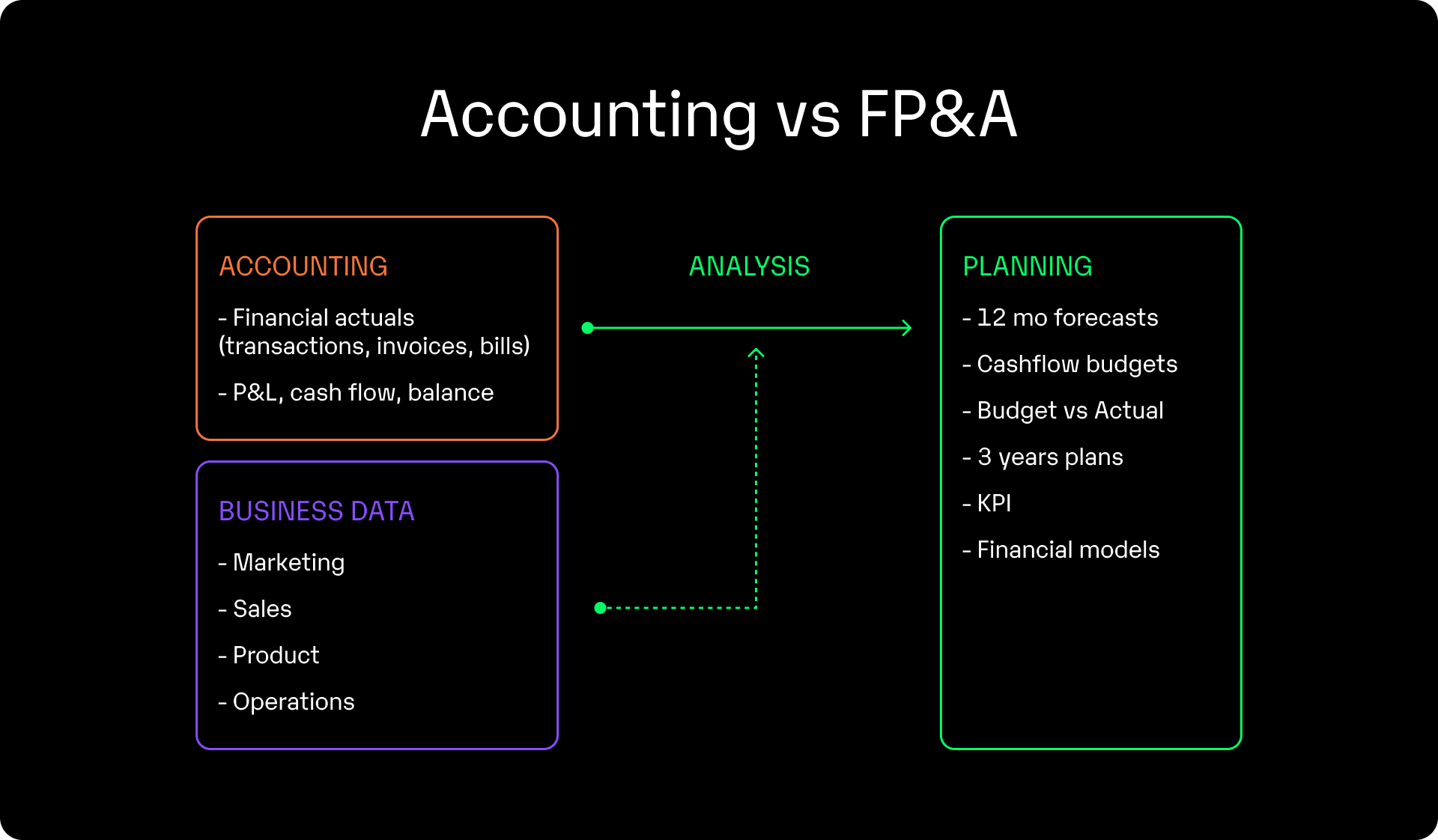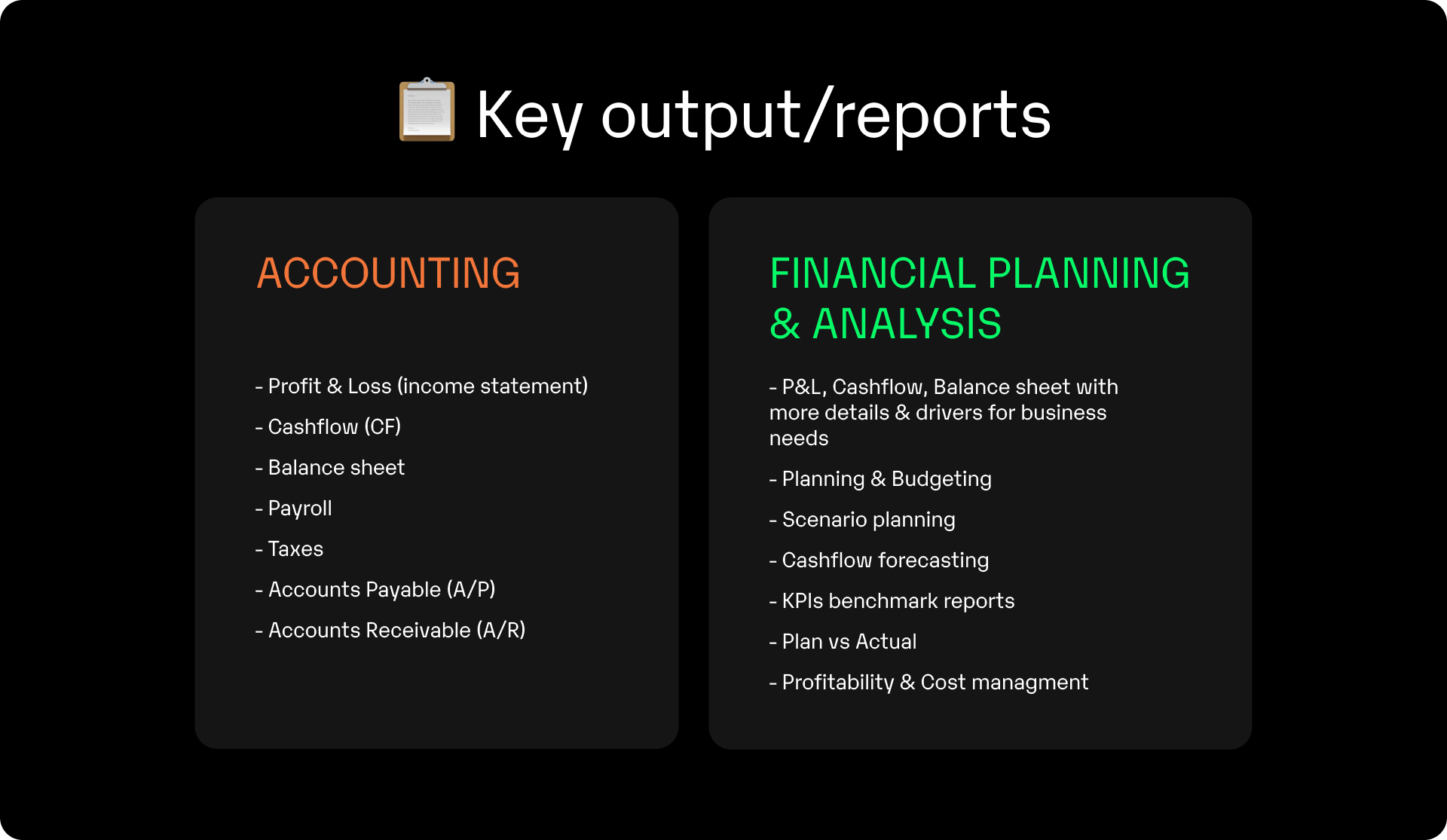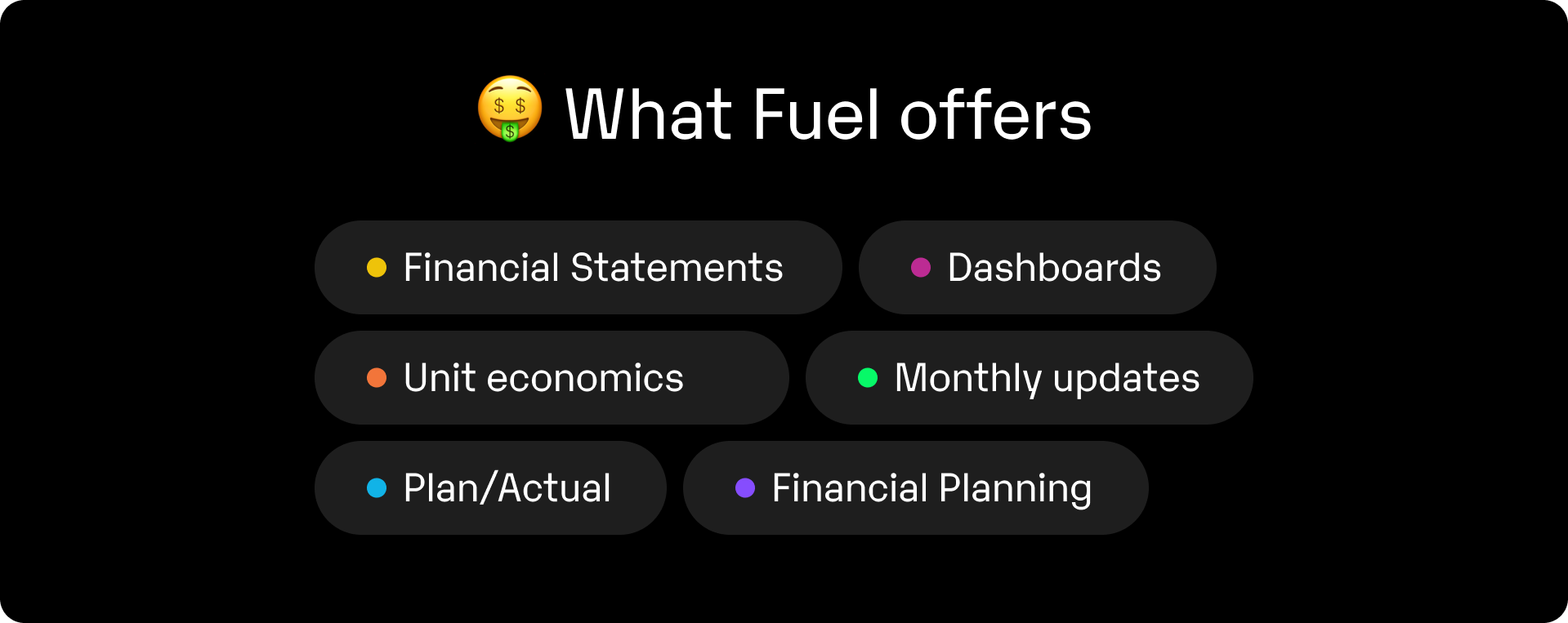


Curious about the FP&A vs accounting distinction? It's a question many founders ask, and for good reason. While these two concepts may look similar on the surface, they differ in various aspects, such as:
In this article, we'll cover these differences and explain why you need both to grow your business.
Accounting serves as the historical record-keeper of your company's financial activities. It involves:
FP&A acts as a company’s crystal ball, predicting its financial future, planning and avoiding common financial mistakes with accurate data analysis.
Here’s the breakdown:
Financial planning
Financial analysis

Don't worry, you're not the only one – many founders confuse FP&A with accounting. That's why we have made this short and simple FP&A vs accounting comparison so you don't make the same mistake.
Accounting should collect your company’s historical financial data and record all transactions.
On the other hand, financial analysis and planning are more forward-looking and help you analyze historical data to inform future financial decisions.

Here are the key outputs of accounting:
And here are the outputs of FP&A:

Accounting answers the question of "what happened" by meticulously documenting transactions, reconciling accounts and preparing financial statements.
FP&A explores the data further to uncover "why it happened" by analyzing economic and business trends, identifying key performance drivers and evaluating the impact of various factors on financial outcomes.
By forecasting future performance, conducting scenario analysis and setting strategic goals, FP&A helps companies answer "how we can get better" and "what our business goals are."
Accounting primarily follows established accounting standards like GAAP (Generally Accepted Accounting Principles) or IFRS (International Financial Reporting Standards). While GAAP or IFRS are the primary drivers for accounting practices and FP&A business needs, FP&A takes a more business-centric approach tailored to the company's specific needs and goals.
When it comes to managing your business finances, two questions arise: what information do I need, and when do I need it? We covered the what, now let’s talk about when.
For accounting, start tracking your money immediately after opening a business bank account or making/receiving your first transaction.
For FP&A, begin with a simple plan from day one, such as using Google Sheets. Your simple plan at the pre-seed or early seed stage should include planning your budgets, runway and very approximate revenue. Check out our free templates to help you with that.
As your business expands and reaches around $30,000 per month in revenue, upgrade to a more advanced system to facilitate smarter decision-making as you grow. In the late seed stage, you’ll have enough data to make more precise forecasts and connect your operational metrics with financial outputs. And if you have already gained momentum and plan to raise series A funding, we’d advise setting up unit economics – all serious investors will ask you for this information.
Accounting reports are usually prepared weekly or monthly. To be more precise, you should update P&L, cash flow and balance sheet on a monthly basis, while some reports like accounts payable, accounts receivable and cash flow may require weekly updates.
Compared to accounting, FP&A operates on a more flexible schedule and uses real-time data, so depending on your business needs, you may update the information daily, weekly or monthly.

Imagine having all your company's financial transactions meticulously recorded but not knowing what they truly mean for your business's future. That's the gap Accounting, while essential, can't bridge alone.
Accounting managers lay the foundation, the system that tracks your day-to-day finances. It ensures accuracy and compliance. But to see the real power of this data and chart a course for growth, you need FP&A.
FP&A is essential for:
Fuelfinance links up with your favorite accounting tools like Xero or QuickBooks, so you can forget about manual data entry. With our financial analysis software, you can focus on growing your business while it handles the numbers.
Here's what you get:

You now know why understanding FP&A versus accounting is crucial for good financial management.
One thing is for sure – both are important! You need to know what happened (accounting) to understand why it happened and what might happen next (FP&A).
With FP&A software like Fuelfinance, you get the best of both worlds. It syncs perfectly with your accounting tools, saves you time and gives you valuable insights into your finances.
No, FP&A is not considered accounting, though you need financial data gathered from accounting to do FP&A.
Accounting focuses on the accurate recording, organizing, and reporting of transactions and key financial metrics. On the other hand, FP&A focuses on analyzing that data and making strategic decisions and financial modeling based on it.
No, you don't need to be an accounting manager to do FP&A, but you need data from accounting. At the pre-seed and early seed stages, you can do accounting tasks on your own and create a simple plan in Google Sheets.
The accounting team is responsible for accurately collecting financial data and ensuring compliance with accounting standards in business operations, while FP&A professionals explore the why behind the data to help companies optimize financial performance and make better decisions.


Just imagine how that would transform your team’s productivity and focus? Talk to our financial experts to know more.